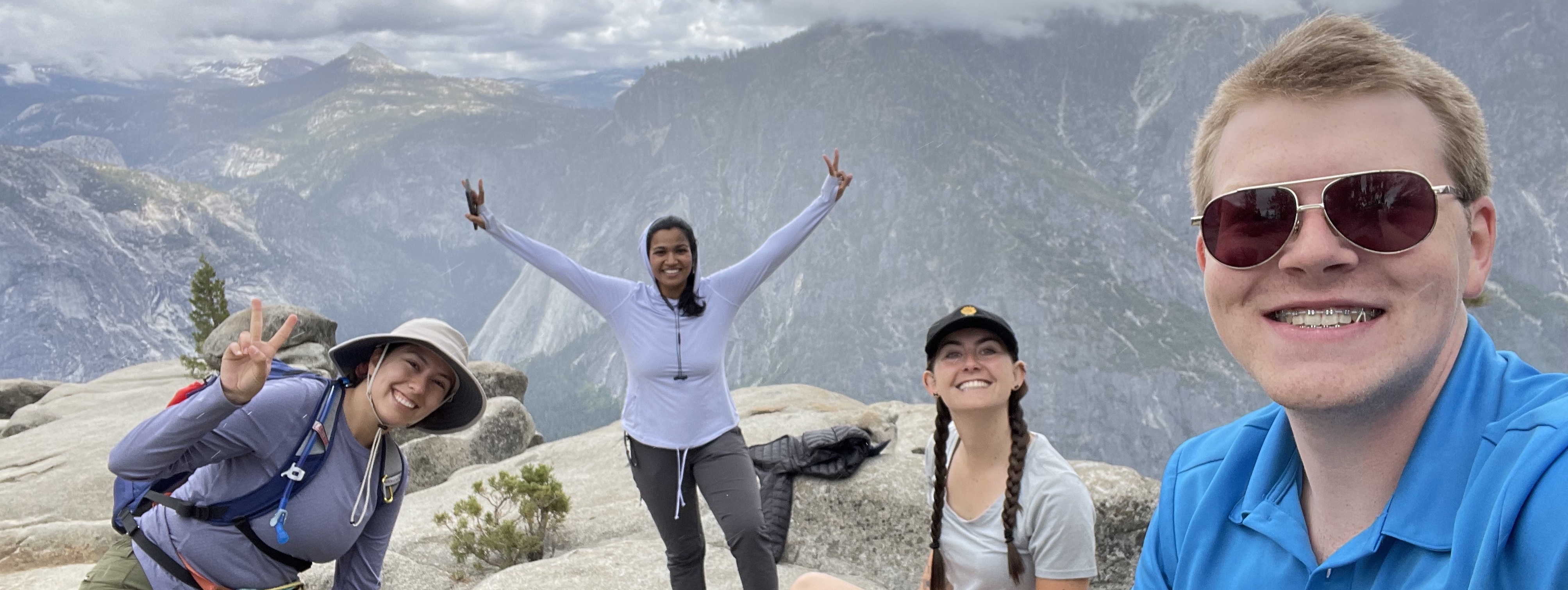Science and Engineering of Environmental Signatures (SEES) Convergence Research Incubator
In small multidisciplinary teams, students work on research and technology challenges that aim for device and process solutions for environmental and sustainable applications. Specific research topics are defined by CONDESA faculty and staff scientists under the three general themes described below, which are in line with the research cores themselves.
Upon joining a group that is in line with at least one of these themes, under the guidance of UC Merced faculty, scholars will research the current state of the art, develop concepts, and perform feasibility studies with the expectation of developing a proposal. The teams will pitch their proposals to a panel of experts to be awarded funds for research related expenses (students who are not receiving travel funds via the full fellowship are eligible to receive $1000 in research travel funds). The students’ skills and graduate development will be boosted by interactions with experts from around the country and the world, visits and access to research facilities and the local Pellissier Family Farm, social events, and participation in technical and professional development activities.
We will be accepeting applications in the winter, and the Incubator will begin in the summer.
Research Themes:
- Detection of Contaminants in Geoenvironments via Nano-enabled Sensors. This theme will focus on nano-enabled sensors for high precision and robust detection of contaminants (including, but not limited to, heavy metals, microplastics, pharmaceuticals, and pathogens) in different geoenvironments, (soil, surface and groundwaters). Low-cost, in situ nano-enabled sensors developed here will allow comprehensive and customized detection of contaminants and will capture variations in concentration in time and space overlooked by conventional approaches.
- Nano-enabled Sensing for Greenhouse Gases and Carbon Cycling in Soil. The design, fabrication, and testing of nano-enabled sensors for the detection of greenhouse gases and carbon cycling in soil will be the goals of this research theme, with the aim of in situ tracking of changes in concentrations of relevant species, with higher spatial and temporal resolution than what is achievable using conventional approaches. Developments in this research direction will yield tools that will help us better understand critical phenomena such as climate change.
- Advanced Quantum Sensing for Geoenvironments. This theme will focus on determining the feasibility of quantum sensing achieved through solid state nanoscale devices for specific environmental sensing applications. The projects undertaken will revolutionize the monitoring of emerging phenomena such as hot spots in soil, and thus present excellent opportunities for trainees to perform cutting-edge fundamental science with environmental relevance.

Top row (left to right): Jorge Arteaga, Kyle Wright, Alexia Cooper, Arya Karappilly Rajan, Anna Jurusik, Maeve McCormick
Bottom row (left to right): Muzzakkir Amin, Adityaa Bajpai, Shelby Defeo, Maria Perez Mendoza, Bruce Barrios
Picture by Teamrat Ghezzehei.
2022 Project Teams
Group 1
- Project name: Spectrophotometric Nitrate Measurement in Natural Waters
- Team members: Shelby DeFeo (Environmental Systems), Sam Erickson (Physics), Maria Perez Mendoza (Physics), Arya Karappilly Rajan (Physics)
- Primary faculty mentors: Marc Beutel (Environmental Systems), Mehmet Baykara (Mechanical Engineering), Tom Harmon (Environmental Systems)
- Secondary faculty mentors: Sayantani Ghosh (Physics) and Michael Scheibner (Physics)
Group 2
- Project name: Remote Sensing of Soil Moisture via Quantum Metrology
- Team members: Jorge Arteaga (Physics), Adityaa Bajpai (Physics), Maeve McCormick (Environmental Systems), Kyle Wright (Applied Math)
- Primary faculty mentors: Michael Scheibner (Physics) and David Strubbe (Physics)
- Secondary faculty mentors: Ryan Baxter (Chemistry & Biochemistry) and Sayantani Ghosh (Physics)
Group 3
- Project name: Utilizing Nano Sensing for Detecting Soil Organic Carbon Cycling
- Team members: Muzzakkir Amin (Materials and Biomaterials Science and Engineering), Bruce Barrios (Physics), Alexia Cooper (Environmental Systems), Anna Jurusik (Environmental Systems)
- Primary faculty mentors: Sayantani Ghosh (Physics), Peggy O'Day (Environmental Systems)
- Secondary faculty mentors: Tom Harmon (Environmental Systems) and Michael Scheibner (Physics)

Group 1 giving their presentation (from left to right: Maria Perez Mendoza, Shelby Defeo, Sam Erickson, and Arya Karappilly Rajan).
Picture by Sara Schneider.
2022 External Speakers
- Matthew Rosen (Massachusetts General Hospital/Martinos Center for Biomedical Imaging and Harvard Medical School): From zero (Tesla) to hero: Effectively translating innovative ideas
- Roger Rennan Fu (Harvard): Quantum magnetic field sensing on meteorites and the oldest Earth rocks.
- Samuel Carter (Naval Research Laboratory): Quantum sensing with solid state spin systems.
- Udo Schwarz (Yale): Visualizing the atomic world.
- Michael Allen (UC Riverside): Sustainable agriculture for the 21st century: A new technological approach building on our past.
- Scott Jones (Utah State University): Soil property sensing: Measurement principles, state of the art and future opportunities.
- Joff Silberg (Rice University): Translating synthetic biology advances into the Earth and environmental sciences.

Dr. Michael Allen giving his presentation on sustainable agriculture during the 2022 Incubator.
Picture by Sara Schneider.
Events

Pellissier Family Farm visit, where the group learned about what challenges farmers face and what needs might exist for sensing and monitoring soil and plant parameters.
Picture by Michael Scheibner.

Socializing during a visit to the local Vista Ranch.
Picture by Sara Schneider.

Hiking during the Yosemite retreat.
Selfie by Sam Erickson.



